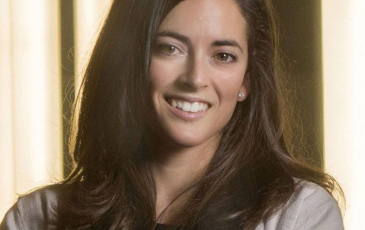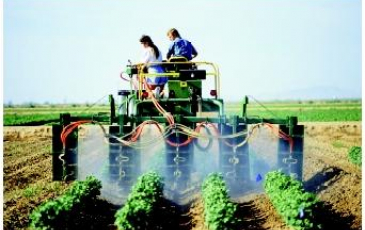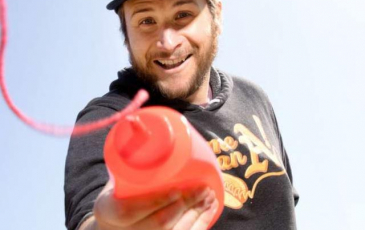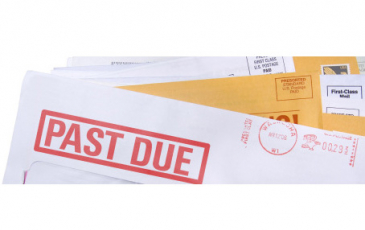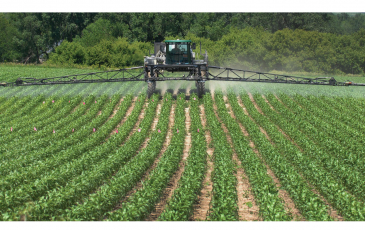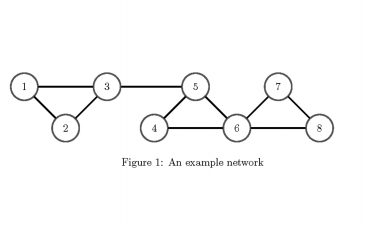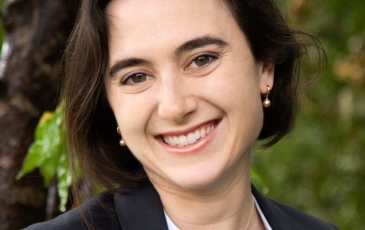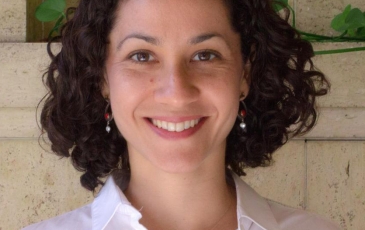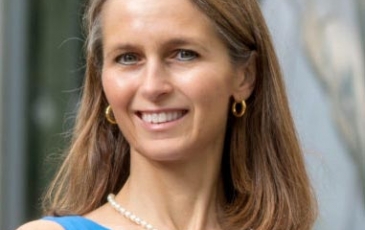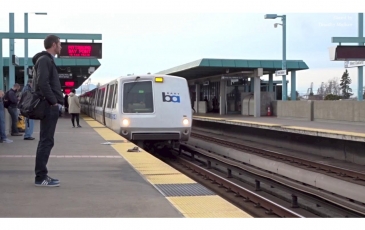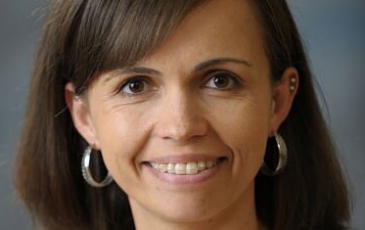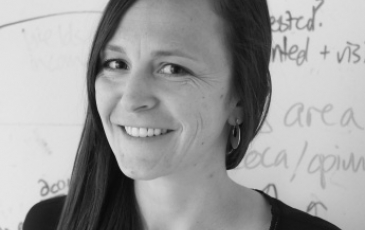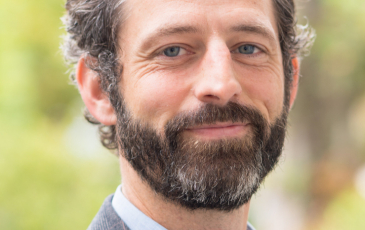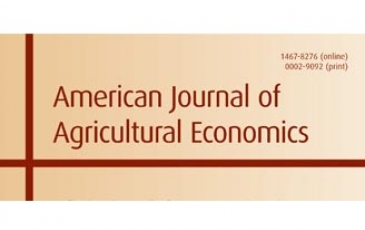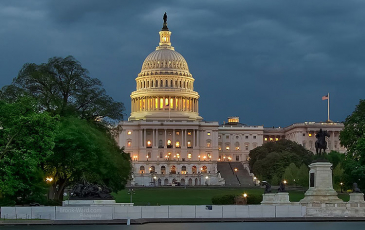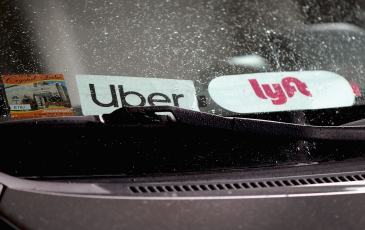Ellen Bruno and co-author, Assistant Professor Heidi Schweizer, North Carolina State University, address California water futures trading in the newsletter The Conversation, a self-described publication of 'academic rigor, journalistic flair.'
Ellen Bruno Recently Published "Missing Markets: Evidence on Agricultural Groundwater Demand from Volumetric Pricing" Jointly with Katrina Jessoe in the Journal of Public Economics
The research suggests that pricing agricultural groundwater use in Southern California leads to small changes in extraction but big changes in surplus. Water trading between urban and agricultural users can substantially mitigate the costs from water supply curtailments.
ARE PhD candidate Hal Gordon: PhD student and the Bay Area's (perhaps world's) Premier Hot Dog Vendor
Hal Gordon is featured in an SFGate sports article this week. Hal is an ARE graduate student studying to be an environmental economist. He wants to know more about how much vegetarians reduce their carbon footprints, and how the food industry might make dietary alternatives more accessible for everyday consumers.
California’s Billion Dollar Energy Bill Question
A looming problem and a proposal. Meredith Fowlie addresses the issue in her recent EI blog.
Dealing with Climate Change in Agriculture Locally
ARE Alumnus '19 Itai Trilnick and Professor David Zilberman explore the potential of new techniques that lower temperatures locally in critical times for crops. "Microclimate Engineering for Climate Change Adaptation in Agriculture: The Case of California Pistachios" is published in the American Journal of Agricultural Economics.
The Political Economy of COVID-19
ARE PhD Students Scott Kaplan and Jacob Lefler publish with ARE Professor David Zilberman in Applied Economic Perspectives and Policy.
Can Targeting Information to Network-Central Farmers Induce More Adoption of a New Agricultural Technology?
This is a question ARE Professor Jeremy Magruder and co-authors address in their forthcoming publication in the American Economic Review.
Katherine Wagner wins 2020 Wallace E. Oates Outstanding Doctoral Dissertation Award
The award is given by the Association of Environmental and Resource Economics. Katherine’s dissertation research combines questions at the heart of environmental economics and public finance, and opens up new avenues for research and policy work. Congratulations Katherine!
"Building Social Cohesion in Ethnically Mixed Schools"
ARE Alumna ('18), Assistant Professor of Economics at the University of Essex, Ceren Baysan, and co-authors, evaluate the impact of an educational program that aims to build social cohesion in ethnically mixed schools by developing perspective-taking ability in children. The paper has been accepted by the Quarterly Journal of Economics.
Catherine Wolfram Joins US Treasury to Lead Energy & Climate Change Policy
Professor Wolfram joins UC Berkeley-Haas Professor Emerita, Treasury Secretary Janet Yellen, and Associate Professor Adair Morse, in President Biden’s treasury department. Professor Wolfram's appointment as deputy assistant secretary for climate and energy economics reflects the administration’s increased focus on fighting climate change.
Latest Issue of ARE Update Now Available Online
The latest issue of ARE Update includes an article written by ARE Professor Larry Karp and co-authors on optimal social distancing policy in the face of uncertain vaccine arrival. Another article features joint work by ARE CE Specialist Ellen Bruno, ARE PhD student Arthur Wardle, and EEP undergraduate Paige Griggs. They discuss how California's Sustainable Groundwater Management Act is unfolding across the state.
New Paper by ARE Professor Marco Gonzalez-Navarro and Co-Authors Investigates the Effect of Subway System Openings on Urban Air Pollution
"Subways and Urban Air Pollution" is forthcoming in the American Economic Journal: Applied Economics.
Is the Supply of Charitable Donations Fixed? Evidence from Deadly Tornadoes
EEP alumna ('06) Tatyana Deryugina has an upcoming publication in American Economic Review: Insights. She was the CNR student commencement speaker, went on to get a PhD from MIT, and is now an Associate Professor at the University of Illinois at Urbana-Champaign.
Can China Benefit From a More Ambitious 2030 Climate Target?
ARE Adjunct Professor Jiang Lin publishes commentary on China's 2030 climate targets.
Britannica Names ARE Alumna ('18) Tamma Carleton a "Young Shaper of the Future"
Tamma Carleton is an Assistant Professor of Economics at the Bren School of Environmental Science & Management at UC Santa Barbara. Her research focuses on questions at the intersection of environmental change and economic development.
ARE Professor Jim Sallee Publishes in AEJ: Economic Policy
The paper titled "Who Benefits when Firms Game Corrective Policies?" is published in the American Economic Journal: Economic Policy.
Alumnus Obie Porteous Mentioned in The Economist
ARE alumnus ('16) Obie Porteous is Assistant Professor at Middlebury College. Results from his paper titled "Research Deserts and Oases: Evidence from 27 Thousand Economics Journal Articles on Africa" were discussed in the December 5th-11th, 2020 issue of The Economist.
Two ARE Alumni Named Editors of AJAE
ARE alumni, Jill McCluskey ('98), Director and Regents Professor in the School of Economic Sciences at Washington State University, and Jesse Tack ('09), Associate Professor in the Department of Agricultural Economics at Kansas State University, will become editors of the American Journal of Agricultural Economics beginning January 1, 2022.
One Berkeley Faculty Member, One Alumnus Join Biden Economic Team
Two economists with Berkeley ties have been named to the administration of President Joe Biden, joining a growing group of Berkeley scholars and alumni who have taken high-level policy positions in Washington, D.C.
The Congestion Costs of Uber and Lyft
In his forthcoming Journal of Urban Economics article, ARE graduate student Matthew Tarduno investigates the relationship between ridesharing and traffic speeds. Leveraging the abrupt departure of Uber and Lyft from Austin, TX, Tarduno finds that ridesharing operations slowed daytime traffic by roughly 2%.

